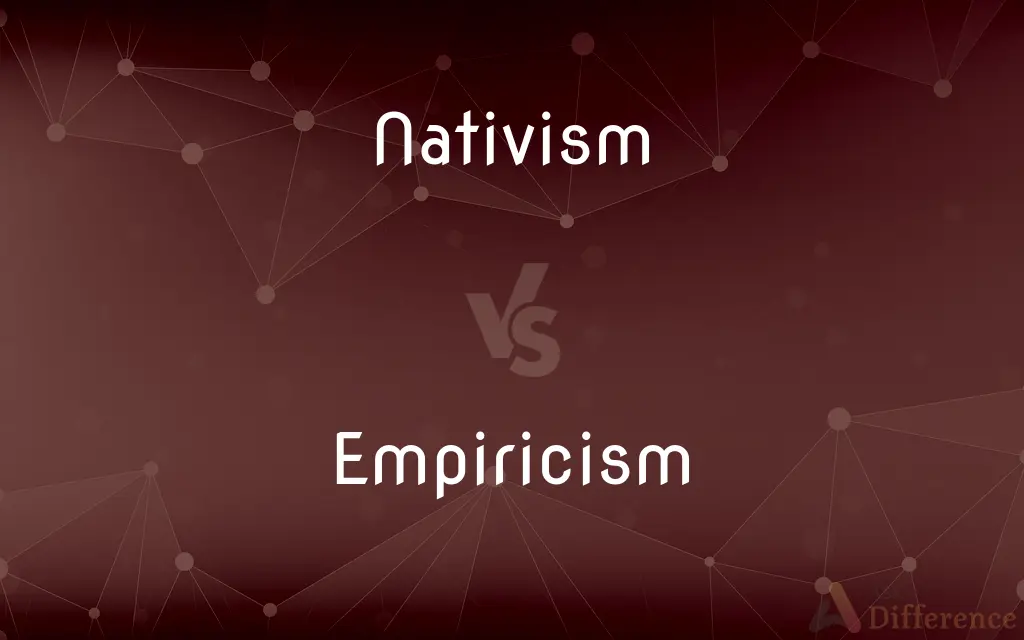Nativism vs. Empiricism — What's the Difference?
Edited by Tayyaba Rehman — By Maham Liaqat — Updated on April 5, 2024
Nativism argues for innate ideas and knowledge, suggesting some concepts are hard-wired into our brains at birth, whereas empiricism posits that knowledge comes solely from sensory experience.

Difference Between Nativism and Empiricism
Table of Contents
ADVERTISEMENT
Key Differences
Nativism, often linked with the rationalist perspective, holds that certain skills or abilities are native or hard-wired into the human brain at birth. This viewpoint suggests that individuals have inherent capacities for language acquisition, logical reasoning, and even moral understanding. Empiricism, on the other hand, championed by philosophers like John Locke and David Hume, argues that the mind at birth is a tabula rasa, or blank slate, and that all knowledge is acquired through experience and sensory input.
Proponents of nativism, such as Noam Chomsky in the realm of linguistics, argue that the complexity and universality of human language can only be explained by the presence of an innate language faculty. Empiricists counter this by emphasizing the role of the environment and learning in language development, positing that language, like all knowledge, comes from perception and interaction with the world.
Nativism suggests that certain cognitive structures and ideas are pre-programmed in humans, potentially explaining phenomena like universal ethical principles or the rapid development of language in children. Empiricism, however, contends that even complex ideas and morals are the result of accumulated experience, shaped by interaction rather than inherent structures.
The debate between nativism and empiricism extends into the field of psychology, influencing theories of human development and education. Nativists might argue for the importance of catering to innate abilities and predispositions in educational curricula, whereas empiricists advocate for experiential learning and exposure to diverse stimuli to foster development.
While the nativist perspective highlights the limitations of sensory experience in explaining certain aspects of knowledge and ability, empiricism emphasizes the adaptability of the human mind and its capacity to learn from the environment, suggesting a more dynamic and plastic understanding of human cognition.
ADVERTISEMENT
Comparison Chart
Definition
Belief in innate ideas or knowledge
Belief that knowledge originates from sensory experience
Key Proponents
Plato, René Descartes, Noam Chomsky
Aristotle, John Locke, David Hume
Focus
Innate cognitive structures and abilities
Learning through experience and perception
Examples in Practice
Language acquisition, logical reasoning abilities
Empirical research methods, sensory-based learning
Educational Implications
Emphasizes catering to inherent abilities
Advocates for experiential learning environments
Compare with Definitions
Nativism
Universal ethics.
Some nativist theories suggest that notions of right and wrong are innate.
Empiricism
Knowledge from sensory experience.
Empiricists believe that all ideas about the world come from experience.
Nativism
Innate ideas and knowledge.
Children are born with an innate ability to acquire language.
Empiricism
Tabula rasa.
John Locke described the mind at birth as a blank slate.
Nativism
Pre-programmed abilities.
Nativists argue that humans have an inherent understanding of basic mathematical principles.
Empiricism
Empirical research methods.
Scientific methods are based on observation and experimentation.
Nativism
Language faculty.
Chomsky's theory of a universal grammar posits an innate linguistic structure.
Empiricism
Adaptability of the mind.
The human mind's ability to learn and adapt is emphasized in empirical theories.
Nativism
Cognitive structures.
The mind has inherent structures for processing and understanding the world.
Empiricism
Learning through interaction.
Language development is a result of interaction and reinforcement.
Nativism
A sociopolitical policy, especially in the United States in the 1800s, favoring the interests of established inhabitants over those of immigrants.
Empiricism
In philosophy, empiricism is a theory that states that knowledge comes only or primarily from sensory experience. It is one of several views of epistemology, along with rationalism and skepticism.
Nativism
The reestablishment or perpetuation of native cultural traits, especially in opposition to acculturation.
Empiricism
The view that experience, especially of the senses, is the only source of knowledge.
Nativism
(Philosophy) The doctrine that the mind produces ideas that are not derived from external sources.
Empiricism
Employment of empirical methods, as in science.
Nativism
A policy of favoring native-born inhabitants over immigrants.
Empiricism
An empirical conclusion.
Nativism
The policy of perpetuating the culture of the natives of a colonised country.
Empiricism
The practice of medicine that disregards scientific theory and relies solely on practical experience.
Nativism
(philosophy) The doctrine that some skills or abilities are innate and not learned.
Empiricism
Medicine as practised by an empiric, founded on mere experience, without the aid of science or a knowledge of principles; folk medicine, quackery.
Nativism
(linguistics) A theory that some knowledge of grammar is innate.
Empiricism
(philosophy) A doctrine which holds that the only or, at least, the most reliable source of human knowledge is experience, especially perception by means of the physical senses. (Often contrasted with rationalism.)
Nativism
The disposition to favor the native inhabitants of a country, in preference to immigrants from foreign countries.
Empiricism
A pursuit of knowledge purely through experience, especially by means of observation and sometimes by experimentation.
Nativism
The doctrine of innate ideas, or that the mind possesses forms of thought independent of sensation.
Empiricism
Used to describe research based on methodology shaped from empirical philosophy (see above), e.g. surveys, statistics, etc.
Nativism
The policy of perpetuating native cultures (in opposition to acculturation)
Empiricism
The method or practice of an empiric; pursuit of knowledge by observation and experiment.
Nativism
(philosophy) the philosophical theory that some ideas are innate
Empiricism
Specifically, a practice of medicine founded on mere experience, without the aid of science or a knowledge of principles; ignorant and unscientific practice; charlatanry; quackery.
Empiricism
The philosophical theory which attributes the origin of all our knowledge to experience.
Empiricism
(philosophy) the doctrine that knowledge derives from experience
Empiricism
The application of empirical methods in any art or science
Empiricism
Medical practice and advice based on observation and experience in ignorance of scientific findings
Common Curiosities
How do these perspectives influence education?
Nativism may support tailored educational approaches based on innate abilities, while empiricism promotes learning through diverse experiences and sensory engagement.
Can these theories be reconciled?
Some contemporary theories, like cognitive development theories, attempt to integrate aspects of both, suggesting a complex interplay between innate predispositions and environmental influences.
Can empirical methods test nativist claims?
While challenging, empirical methods can investigate nativist claims by studying universal patterns of development and cognitive abilities across different environments.
Is morality considered innate or learned according to these theories?
Nativism might argue for an innate sense of morality, while empiricism suggests moral understanding develops through social interaction and experience.
Are there any areas where nativists and empiricists agree?
Both agree on the importance of the developmental process, though they differ on the origins of the capabilities that drive this process.
What implications do these theories have for artificial intelligence?
They inform approaches to AI, with nativism influencing the design of innate learning structures and empiricism informing adaptive, experience-based learning algorithms.
How does nativism explain language acquisition?
Nativism suggests that humans are born with a specialized capacity for language learning, enabling children to rapidly acquire language.
What role does sensory experience play in empiricism?
Sensory experience is foundational in empiricism, serving as the primary source of all knowledge and understanding.
Do nativism and empiricism influence psychological research?
Yes, they influence research approaches and theories in psychology, particularly in areas like cognitive development, language acquisition, and learning theories.
How do nativism and empiricism view the mind's structure?
Nativism posits that the mind has pre-existing structures for thought and understanding, whereas empiricism views the mind as initially blank, shaped by experience.
What is an example of a concept that challenges empiricist views?
The rapid acquisition of language in children with limited exposure to complex linguistic input challenges strict empiricist views, suggesting an innate component.
What is the main difference between nativism and empiricism?
The main difference lies in the source of knowledge: nativism posits innate origins, while empiricism attributes knowledge to experience.
How do cultural differences impact these theories?
Cultural differences in cognitive and linguistic development offer insights into the interaction between innate capacities and environmental influences, providing a testing ground for both theories.
Is one theory more accepted than the other in contemporary psychology?
Contemporary psychology often integrates elements of both, recognizing the contributions of innate structures and sensory experience to human cognition.
How has the debate between nativism and empiricism evolved?
The debate has evolved with advances in neuroscience and psychology, incorporating evidence of innate brain structures and the impact of experience on brain development.
Share Your Discovery

Previous Comparison
Crotch vs. Crutch
Next Comparison
Civilization vs. BarbarismAuthor Spotlight
Written by
Maham LiaqatEdited by
Tayyaba RehmanTayyaba Rehman is a distinguished writer, currently serving as a primary contributor to askdifference.com. As a researcher in semantics and etymology, Tayyaba's passion for the complexity of languages and their distinctions has found a perfect home on the platform. Tayyaba delves into the intricacies of language, distinguishing between commonly confused words and phrases, thereby providing clarity for readers worldwide.
















































